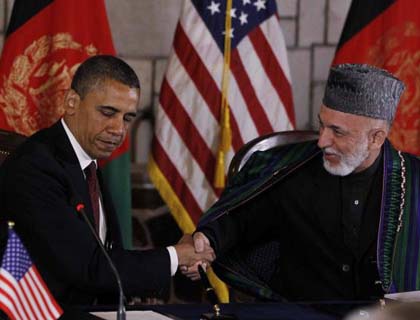During past few weeks, the United States officials have commenced emphasizing on signing the strategic cooperation which determines the future biliteral relation. The latest statements came from James F. Dobbins, the US especial envoy for Pakistan and Afghanistan, saying that Kabul and Washington officials should reach to an agreement within coming weeks. He emphasized the strategic cooperation contract should not change into one of the presidential campaign which will start later this year.
However, there is growing support for the contract as all political oppositions and civil society activists deem as insurance for the protection of Afghanistan sovereignty and democratic achievements. It is largely believed that uncertainty over the presence of US security forces beyond 2014 has already dealt serious blow to economy.
Investors and entrepreneurs have pulled out their money, fearing about the possible broke out of insecurity and instability.
In spite of all that, the government particularly Mr. President had deliberately delayed the agreement. It is not clear what he indeed urges the US to do because as far as it concerns to country’s independence, territorial integrity and national sovereignty---the three things that President Karzai till now has said as reasons for hesitation---the US promised to be supportive. US officials openly promised to equip Afghan security forces with heavy weapons.
Additionally, it has spent billions of dollars and made huge military sacrifices to stabilize the country and enable to stand on its own feet. So, is it acceptable to say that after such serious efforts that it pulls back and try to ignore the very things that it fought for?
However, the US and Kabul officials have met to talk about ins and outs of the pact, but yet it is not finalized due to some disagreement which as I mentioned has remained vague. Initially, there were claims that US officials did not show much interest in signing a contract which will impose short-term as well as long-term expenses on the strained budget boxes of the Washington. Reportedly, it wanted that there should not be anything to be called strategic cooperation pact, instead there should be a mere “a strategic declaration”.
One of the issues that Kabul uses as strong card to ratchet up pressure is the military bases. It is highly possible that US keep or even establish military bases in order to with the growing threat of terrorism and insurgency which was the main cause of US-led attack in 2001. Both Kabul and Washington are in need of security and military insurance. The US needs to be ensured that Afghanistan, on which it has spent billions of dollars and lost lives of thousands of its well-trained troops, will not turn back to its previous stage 2001. In other word, it should be guaranteed that Afghanistan will not become the safe heaven for terrorism and its allies through which it organizes attacks and threatens the regional and global security.
Meanwhile, Afghanistan also needs a security and military insurance which assist it in urgent times. Since 2001, Afghan people have paid and made huge sacrifices, acquiring current state of democratic institution, economic welfare, and, more importantly, freedom and liberty. What if after the military withdrawal of international community, insurgency reestablishes its damaged establishment and its supporters help it again to fight fiercely with Kabul government?
Wouldn’t it be existential threat? Of course it will be. With the presence of US, the supporters of Taliban-led militants would not dare to support openly them or in such extent to be deemed as existential threat to Kabul government.
In addition, lack of strategic cooperation, in deed, means a complete disengagement of US, which would prove a terrible mistake as it happened after military withdrawal of USSR that paved way for extremism and fundamentalist to fill the gab of central power after the outstation of Najib government. Leaving Afghanistan once again is the same strategic mistake that would be compensated by paying invisibly economic price. But the cost will hit the height and prove too costly both for Afghanistan and international community.
Sincerely speaking, disengagement means once again allowing sectarian and communal forces which have been fuelled largely from our neighbors during decades to play role and shape the political and economic destiny of the country. That would be a calamity as the national interest of our neighbors generally cross cut our national interest.
In such situation, who will prefer other’s national interest on his own? But the case differs with the US. As our prime National interest---stabilizing the country and eliminating insurgency----is in line with the US national interest.
Thus, it should be noticed by officials further straining the bilateral relation with US is not benefit of Afghan people. However, it is claimed that President Karzai intentionally want to step back from the signing of the contract in order to spark worry among all layers of the society. This will help that his oppositions call for the signature of the security contract and through that he gets a historical acquit if something goes wrong. But whatever is the reason, the consequences that the dominant uncertainty has on the country can be justified. The shrinking investment have already caused huge rate of unemployment and if the situation continues the public dissent increase which is consequential for the government and fledgling peace and security. Hope Afghan officials accelerate the process and send a strong message to oppositions that the US may not leave the country.
So, the only option for them is to forgive the recapture of the power to armed struggle.

